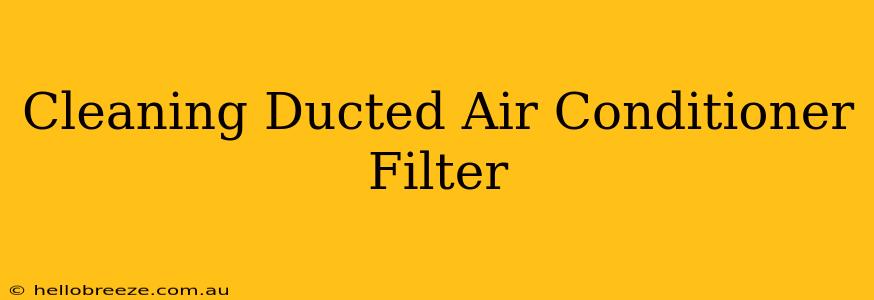Maintaining a clean ducted air conditioner is crucial for optimal performance, energy efficiency, and, most importantly, your family's health. A neglected filter becomes a breeding ground for dust, mold, and other allergens, compromising indoor air quality. This comprehensive guide will walk you through the process of cleaning your ducted air conditioner filter, ensuring cleaner air and a longer-lasting system.
Understanding Your Ducted Air Conditioner Filter
Before diving into the cleaning process, it's vital to understand the type of filter you have. Ducted air conditioners utilize various filter types, each requiring a slightly different approach. Common types include:
- Standard fiberglass filters: These are the most common and least expensive. They're designed to trap larger dust particles but need frequent cleaning or replacement.
- Pleated filters: Offering greater surface area than fiberglass filters, pleated filters capture more dust and require less frequent cleaning.
- HEPA filters: High-Efficiency Particulate Air (HEPA) filters are the most effective at trapping even the smallest particles, including allergens and pollutants. These typically require professional cleaning or replacement.
- Electrostatic filters: These filters use electrostatic charge to attract and trap dust particles. They often require less frequent cleaning than other types.
Knowing your filter type will help you determine the best cleaning method and frequency. Always check your air conditioner's manual for specific instructions and recommendations.
Step-by-Step Guide to Cleaning Your Ducted Air Conditioner Filter
Safety First! Always turn off your air conditioner's power supply before beginning any cleaning process.
1. Locate Your Filter: The location of your filter varies depending on the make and model of your air conditioner. Consult your owner's manual to find its exact location. It's often situated within the air handling unit, which is usually found in a utility closet, attic, or basement.
2. Carefully Remove the Filter: Gently remove the filter from its housing. Avoid forcefully pulling it, as this could damage the filter or its housing.
3. Inspect the Filter: Assess the level of dirt and debris. If it's heavily soiled or damaged, it's best to replace it with a new filter. If it's mildly dirty, cleaning is possible.
4. Cleaning Methods:
- Vacuuming: For lightly soiled filters, use the brush attachment of your vacuum cleaner to gently remove loose dust and debris. Work in one direction to prevent spreading dust.
- Washing (For washable filters ONLY): Some filters, particularly pleated ones, can be washed. Gently rinse the filter with lukewarm water. Avoid using harsh detergents or chemicals. Allow the filter to air dry completely before reinstalling. Never wash HEPA filters; they must be replaced.
5. Reinstalling the Filter: Once the filter is clean and dry, carefully reinstall it in its housing, ensuring it's correctly aligned.
Maintaining Clean Air: A Proactive Approach
Regular filter cleaning or replacement is key to maintaining healthy indoor air quality. Aim to clean or replace your filter every 1-3 months, or more frequently if you have pets, allergies, or live in a dusty environment. Check your manufacturer's recommendations for the optimal cleaning or replacement schedule.
Beyond Filter Cleaning: Complete Air Conditioner Maintenance
While cleaning the filter is crucial, a comprehensive approach to air conditioner maintenance ensures peak performance and extends its lifespan. Consider these additional steps:
- Regular Inspections: Visually inspect the air conditioner unit for any signs of damage, leaks, or blockages.
- Professional Servicing: Schedule an annual professional service to address more complex maintenance tasks and identify potential problems early. This is especially important for preventing costly repairs down the line.
By following these guidelines, you can keep your ducted air conditioner running efficiently, improve your indoor air quality, and ultimately contribute to a healthier and more comfortable home environment. Remember, clean air is essential for good health!

